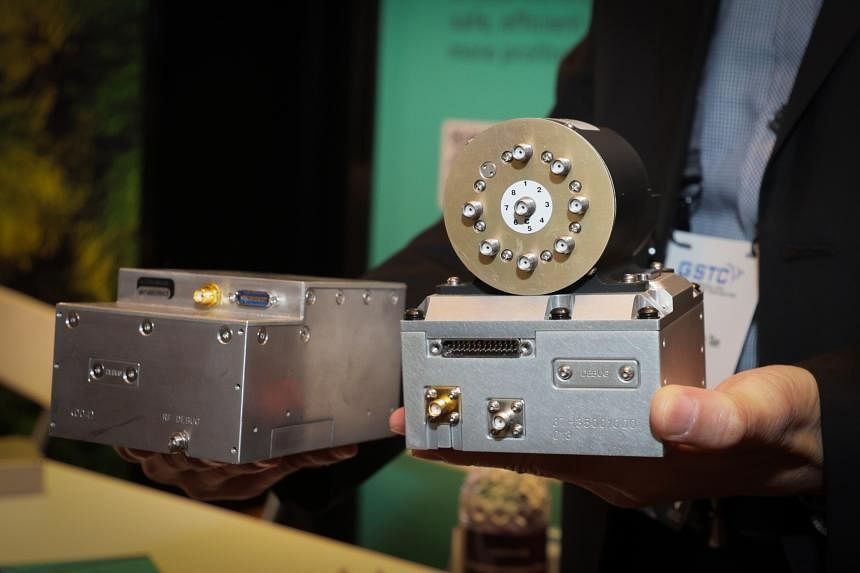SINGAPORE: Technology developed in Singapore is set to be part of the world’s first commercial manned space station to orbit Earth by as early as August 2025.
The metal space device from its company AdValue Technologies acts like a Wi-Fi network between the spacecraft and Earth, allowing constant communication between astronauts and ground operators.
More than 1,000 satellite carriers around the world are AdValue’s customers, and the company also manufactures equipment such as communications systems for ships. However, this is the first time the technology will be used on a manned mission.
The deal with US aerospace company Vasto, which is building a commercial space station called Haven 1, was announced on the sidelines of the World Space Technology Conference held at the Sheraton Towers Singapore on February 15.
Currently, most commercial satellites and spacecraft are connected to Earth only about 4 percent of their time in space, making it difficult to respond to emergencies and collect timely data from space. It has become.
The spacecraft connects with Earth as it flies directly above the ground station. This occurs every 90 minutes when completing an orbit. Tan Kai Pang, AdValue’s chief executive, said ground station operators have only 10 to 15 minutes to “talk” to a vehicle before it falls off the radar.
The lack of continuous communication is especially problematic when humans are in space and safety is at stake.
AdValue provided Vasto with technology called Intersatellite Data Relay System (IDRS). This allows Haven-1 and its occupants to continuously communicate with Earth. The IDRS terminal, which will be attached to the space station, is a modest-looking metal box that can be held in one hand and weighs just 1 kg. However, its cost is six figures. AdValue declined to provide cost details.
Illustrating the value of continuous communication between space and people on Earth, David Caponio, Vast’s senior vice president of product and business development, said: “At a conference last year, an electron microscope vendor asked me if I wanted to control the microscope using an iPad.
“I asked, ‘Where is the microscope?’ In your lab? He said, ‘No, it’s on the ISS now.’
The International Space Station (ISS) is one of only two space stations in orbit. It is operated by five national space agencies, including the National Aeronautics and Space Administration (NASA). The Tiangong Space Station is operated by China.
The ISS, along with military satellites, tends to have proprietary communications technology that has not been commercialized.
The ISS is expected to be retired by 2031, meaning many commercial astronauts and companies are eyeing Haven 1. Haven 1 will remain in orbit for three years to advance space science, enable research, and provide spaceflight opportunities. Vasto plans to have four astronauts on board each mission.
The space station will serve as an outer space laboratory where life science research and in-space manufacturing of new medicines will take place in a microgravity environment. Since the ISS was launched in 1998, he has performed more than 3,000 experiments inside the spacecraft.
Caponio added: “You can’t make things and sell them easily on the ISS. But on a commercial space station, there are no restrictions on that.”
AdValue’s role in the upcoming space station is an example of Singapore’s role in the global space scene. Although Singapore is not a space nation, its contribution lies in building high-tech components and small satellites, and leveraging space to support sectors such as aviation, maritime, climate change and telecommunications.
To help authorities identify hijacked vessels and illegal fishing activities, ST Engineering Geo-Insights has developed a software platform called KnOcean that analyzes vast ocean images captured by satellites.
Go In Nam, general manager of a joint venture formed by DSO National Laboratory and ST Engineering, said such boats and fishing boats usually have their identification systems turned off, meaning only satellites can spot them. That’s what it means.
Since 2011, Singapore has launched more than 30 satellites, nine of which were launched in 2023 alone. The country has more than 60 domestic and foreign space technology companies, with a total of more than 2,000 experts and researchers.
Deputy Prime Minister and Coordinating Minister for Economic Policy Heng Swee Keat said at the conference: In particular, we must focus on opportunities to advance space technology in ways that are impactful, responsible, and accessible. ”
DPM Heng added that apart from identifying niche areas in the space sector, there is a need to develop human resources across sectors to improve the country’s overall space capabilities.
The competition was organized by the non-profit Singapore Space Technology (SSTL).
The Department of Space Studies, a spin-off of SSTL, is a leading platform that provides opportunities for students and young people to learn about space, enter the space sector and develop skills in science, technology, engineering and mathematics (Stem).
These are done through competitions such as the annual International Space Challenge, internships, and workshops on building satellites and understanding spacecraft.
To further develop these programs and develop more talent for Singapore’s space industry, many of these initiatives aimed at students and adults under 35 will be brought under a new organization called Expand Space. It was integrated and presented at the Department of Astronautics’ Stem Education Forum on February 14th.
This new platform will culminate in an annual conference-like event for space and deep technology enthusiasts. The first event will be held in November.
Milo Space Science Institute, led by Arizona State University, will conduct a 12-week course in March for Arizona State University students and alumni to understand how space missions and lunar exploration work I plan to.
The School of Astronautics also launched an internship program in 2023 to introduce high school students to local space companies. So far, about 40 students have completed internships at companies such as Aliena, a manufacturer of satellite engines, and Kymeta, a satellite communications company. – Straits Times/ANN
